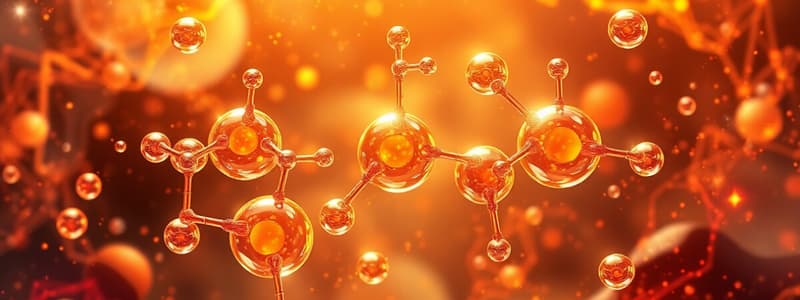Podcast
Questions and Answers
What is the color change observed when an aldehyde is added to Fehling's solution?
What is the color change observed when an aldehyde is added to Fehling's solution?
- Blue to green to red
- Blue to green to orange to red (correct)
- Blue to purple to white
- Blue to yellow to orange to red
Which of the following compounds does not contain an alpha hydrogen and can undergo the Cannizzaro reaction?
Which of the following compounds does not contain an alpha hydrogen and can undergo the Cannizzaro reaction?
- Acetaldehyde
- Acetone
- Salicylaldehyde (correct)
- Benzaldehyde (correct)
Which test can be applied to identify compounds that contain a terminal methyl group?
Which test can be applied to identify compounds that contain a terminal methyl group?
- Tollen's test
- Lucas test
- Iodoform test (correct)
- Benedict's test
What is produced when an aldehyde undergoes the Cannizzaro reaction?
What is produced when an aldehyde undergoes the Cannizzaro reaction?
What is a positive result of the sodium nitroprusside test indicated by?
What is a positive result of the sodium nitroprusside test indicated by?
Which aldehydes do not yield sharp results in Fehling's test?
Which aldehydes do not yield sharp results in Fehling's test?
What condition is required for a positive Cannizzaro reaction?
What condition is required for a positive Cannizzaro reaction?
What product is obtained before purifying benzoic acid in the Cannizzaro reaction?
What product is obtained before purifying benzoic acid in the Cannizzaro reaction?
What general formula do ketones follow?
What general formula do ketones follow?
Which reagent will produce a yellow or orange precipitate when reacted with aldehydes and ketones?
Which reagent will produce a yellow or orange precipitate when reacted with aldehydes and ketones?
What is the main purpose of using Tollen's reagent in the identification process?
What is the main purpose of using Tollen's reagent in the identification process?
Which of the following aldehydes will give a positive Tollen's test?
Which of the following aldehydes will give a positive Tollen's test?
What is formed when aldehydes are oxidized in the presence of Tollen's reagent?
What is formed when aldehydes are oxidized in the presence of Tollen's reagent?
What role does ammonium hydroxide play in Tollen's reagent?
What role does ammonium hydroxide play in Tollen's reagent?
Which one of the following statements is true regarding the oxidation of ketones?
Which one of the following statements is true regarding the oxidation of ketones?
If no precipitate forms in the reaction of an unknown compound with 2,4-Dinitrophenylhydrazine, what can be concluded?
If no precipitate forms in the reaction of an unknown compound with 2,4-Dinitrophenylhydrazine, what can be concluded?
Flashcards
Aldehyde general formula
Aldehyde general formula
RCHO, where R can be aliphatic or aromatic, and in formaldehyde, R is hydrogen.
Ketone general formula
Ketone general formula
RCOR', where R and R' can be aliphatic or aromatic.
2,4-Dinitrophenylhydrazine test
2,4-Dinitrophenylhydrazine test
Used to test for aldehydes and ketones; produces yellow/orange precipitate.
Tollen's reagent
Tollen's reagent
Signup and view all the flashcards
Fehling's reagent
Fehling's reagent
Signup and view all the flashcards
Aldehyde oxidation
Aldehyde oxidation
Signup and view all the flashcards
Ketone oxidation
Ketone oxidation
Signup and view all the flashcards
Carbonyl group
Carbonyl group
Signup and view all the flashcards
Fehling's test
Fehling's test
Signup and view all the flashcards
Fehling's test positive result
Fehling's test positive result
Signup and view all the flashcards
Fehling's test negative result
Fehling's test negative result
Signup and view all the flashcards
Iodoform test
Iodoform test
Signup and view all the flashcards
Sodium nitroprusside test
Sodium nitroprusside test
Signup and view all the flashcards
Polymerization reaction
Polymerization reaction
Signup and view all the flashcards
Cannizzaro reaction
Cannizzaro reaction
Signup and view all the flashcards
Cannizzaro reaction product
Cannizzaro reaction product
Signup and view all the flashcards
Study Notes
Experiment 4: Identification of Aldehydes and Ketones
- Aldehydes: Compounds with the general formula RCHO. R can be alkyl or aryl groups, and in formaldehyde, R is a hydrogen atom.
- Ketones: Compounds with the general formula RCOR'. R and R' can be alkyl or aryl groups.
- Carbonyl Group (C=O): A key functional group found in both aldehydes and ketones. It's responsible for many of their chemical and physical properties.
- Examples of Aldehydes: Formaldehyde, acetaldehyde, propionaldehyde, benzaldehyde, salicylaldehyde
- Examples of Ketones: Acetone, acetophenone, benzyl methyl ketone, benzophenone
- General Test (2,4-Dinitrophenylhydrazine): Both aldehydes and ketones react with 2,4-Dinitrophenylhydrazine to form a yellow or orange precipitate.
- Procedure (General Test): Add 2 drops of the compound to 3 drops of the reagent. Observe for a precipitate. If insoluble in water, dissolve compound in 1 ml methanol first, then add the reagent.
Differentiation Tests (Aldehyde vs. Ketone)
- Tollen's Test (Reduction of Ammonical Silver Nitrate): This reagent distinguishes aldehydes, which form a silver mirror, from ketones, which do not.
- Procedure (Tollen's Test): Add 2-3 drops of the compound to 2-3 ml of Tollen's reagent. Formation of a silver mirror indicates an aldehyde. Warm the test tube in a water bath if no reaction occurs.
- Fehling's Test: Aldehydes, but not ketones, reduce Fehling's reagent (a deep blue solution), forming a red precipitate of cuprous oxide (Cu2O).
- Procedure (Fehling's test): Add 5 drops of the compound to 1 ml of Fehling's solution. Heat in a water bath for 5 minutes (with shaking for water insoluble compounds). A change in color to green, orange, and then red precipitate or copper mirror suggests an aldehyde.
- lodoform Test: This test is specific for compounds containing a terminal methyl group (CH3) on a carbonyl group.
- Sodium Nitroprusside Test: Used for compounds with terminal methyl groups. A red color complex indicates a positive test.
- Polymerization Reaction: Formaldehyde and salicylaldehyde react with resorcinol and sulfuric acid to form a colored polymer.
Cannizzaro Reaction
- Cannizzaro Reaction: Aldehydes without alpha hydrogens can undergo self-oxidation-reduction reactions in a strong basic medium. The reaction produces an alcohol and a carboxylic acid salt
- Procedure (Cannizzaro): Add a few drops of the aldehyde (e.g., benzaldehyde) to 0.5 ml of 30% sodium hydroxide, heat slowly, and add distilled water. Concentrated hydrochloric acid can be added to liberate benzoic acid as a precipitate.
Studying That Suits You
Use AI to generate personalized quizzes and flashcards to suit your learning preferences.




